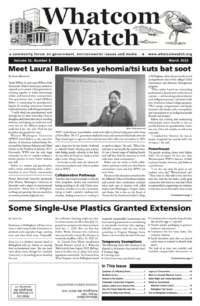by Luisa Loi
Businesses in Bellingham will have more time to find compostable alternatives to products such as produce bags, catering trays and clear food wrap. Originally, the ordinance banning single-use plastics from eateries, in effect since July 31, granted an exemption for these products until Jan. 1, 2023. But, on that day, Public Works Director Eric Johnston announced with a memo his decision to extend the deadline to Dec. 31, 2023 (1).
As Toward Zero Waste coordinator Brandi Hutton stated in a Whatcom Watch article from August 2022, Bellingham is the first city to adopt such strict regulations nationwide. The Toward Zero Waste Program, run by Bellingham-based nonprofit Sustainable Connections, has been assisting businesses in transitioning to sustainable inventory after signing a $38,000 contract with the city, which according to Program Manager Jenna Deane is set to end by the end of the year.
Temporary Exemptions
The following items will continue to be allowed in businesses that provide food:
• Produce bags
• Catering trays
• Clear food wrap and shrink wrap
• Containers for uniquely shaped foods, like deviled eggs or cupcakes
• Flexible plastic packaging to preserve freshness and moisture
• Containers for hot meat items, like rotisserie chicken
• Small absorbent pads that are placed under meat or seafood to absorb their juices
The lack of at least two suitable and available compostable alternatives to these single-use products (a necessary condition to mandate the transition) is what warranted Johnston’s decision. This means that there could be further bumps to the extension for as long as compostable and cost-effective items continue to be unavailable.
“I think it’s just the reality of the market needing time to catch up to the demand for compostable products,” Deane said, adding that Sustainable Connections saw the extension coming months before.
“And it’s hard to know the timeline of the market,” she said. “What I do see as far as potential is giving businesses more time to catch up to be compliant with the original list of items that are restricted.”
Best Options
Once these vendors become available, Deane said the program will help businesses in finding the best options based on their needs. “We encourage businesses to reach out to us if they’re having any trouble in finding compostable items currently or in the future with this new list,” she said.
According to Amy Cloud — the city’s communications and outreach director — and Deane, the ordinance has been showing positive results and receiving positive feedback from local business owners.
“The goal in the ordinance is to reduce the amount sent to landfill and increase organic composting with an aerobic process reducing methane emissions,” Cloud wrote in an email to Whatcom Watch.
“The changes that have come from this ordinance help address the large and growing set of problems caused by the rapid increase in plastic products that are used once and then discarded. These include the climate effects of ever-growing petroleum-based plastic production, human and animal impacts from the breakdown of plastic in the environment, a collapse in the global market for plastic recycling and growing litter problems.”
Supply Chain Issues
Some issues remain. According to information provided by Cloud, some businesses are still using backstock, while others struggle with ordering new resources due to supply chain issues that caused a rise in costs.
“Some businesses are still coming up to speed on what this ordinance means for them,” she added.
Businesses that are unable to comply with the current restrictions can submit a waiver to the Department of Public Works, valid for one year (2).
What Existing Law Requires
The use of single-use plastics in Bellingham is regulated by a combination of state law and city ordinance. Though the city’s Public Works Department has granted a compliance extension for certain items noted in the accompanying article, the use of the following is banned, according to Sustainable Connections, a nonprofit organization hired by the city to educate businesses and the public about the regulations.
Groceries and Catering
State Law and City Ordinance
• Thin plastic bags are prohibited — except for the temporary exemption granted produce bags. Reusable plastic or paper bags are permissible if a fee of eight cents is charged. Compostable bags can be provided at no charge. Stores are not required to charge for small paper bags (bags smaller than 882 cubic inches). However, all paper bags must meet the 40 percent post-consumer-recycled content or wheat-straw minimum and be labeled with this percentage on the bag. [State law]
• Grocery stores that have in-store dining or takeout facilities will follow the same rules as outlined above for restaurants. [City ordinance]
• Single-use plastics cannot be used to repackage foods for distribution or sale. Food items prepackaged by a manufacturer and sold at retail are not regulated. [City ordinance]
Lodging
City Ordinance
• Small plastic bottles less than six ounces for personal care products (shampoo, lotion, soap) can no longer be provided in rooms.
• Businesses are encouraged to use refillable dispensers.
• As an accommodation for people with disabilities, small bottles are to be provided upon customer request.
Other Retail Businesses
State Law
• Thin plastic bags are prohibited for all purposes. Reusable plastic or paper bags are permissible if a fee of eight cents is charged. Compostable bags can be provided at no charge. [State law]
• Food banks and food assistance programs are not considered retail businesses and are therefore exempt.
For more information, visit the Sustainable Connections web site: http://sustainableconnections.org/single-use-plastics/
Sources:
1. SUP Limited Time Exemption 2023 (cob.org)
2. https://cob.org/services/environment/plastic-bag-ban/single-use-plastic-exemption-form
______________________-
Luisa Loi is a freelance reporter based in Bellingham with an interest in covering local environmental issues. You can learn more about Luisa through her LinkedIn (Luisa Loi), or by reaching out to luisaloi@ live.com.





























